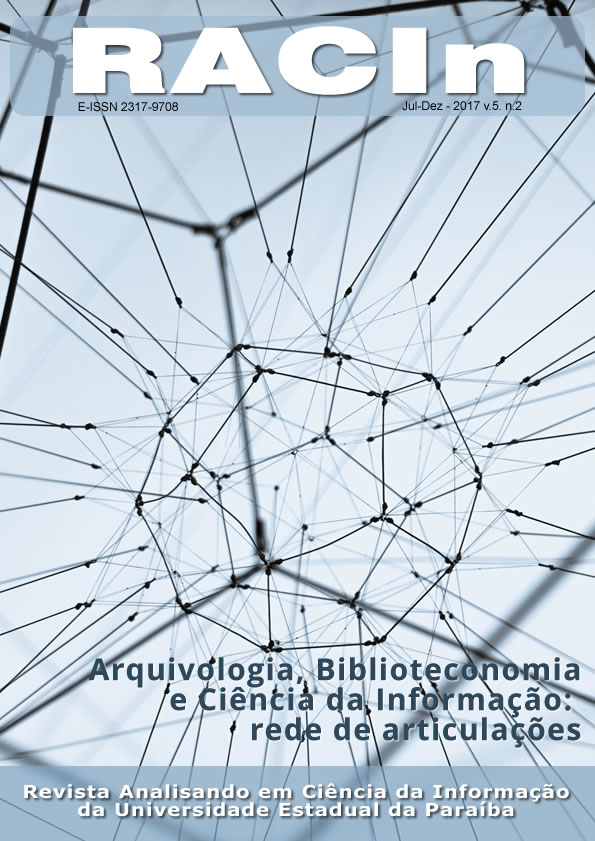ORGANIZATION OF KNOWLEDGE IN THE CONVERGENCE CULTURE ERA
FANFICTIONS AND CLASSIFICATION CURATION
Keywords:
Convergence Culture, Fanfictions, Author-function, Classification curationAbstract
Fanfictions can be defined as a production of fictional stories in a canon and written by fans. In this sense, a current research, the universe of the fadões and the activities inherent to them, relating it with an Information Science. We used the concepts coined by Jenkins (2009) and Levy (1998), respectively: media convergence that is product of technological evolution and integration of various media, participatory culture that defines a content consumer action to produce i- Lo and collective intelligence, which defines a union of prior knowledge to create a shared intelligence in a specific group. In order to study the classificatory process of fanfictions no site Nyah! and characterize the writer / Use of research data in bibliographic and descriptive research allied to the application of online questionnaire for data collection. It was found that the Fandoms (fan communities) are composed mostly by female students. The site of fanfictions Niah! constitute two filters to classify their histories, being: category and gender. The research process conducted by fans takes into account the plot of the story to the detriment of the pre-established category and genre. The collected data demonstrate that a good part of the users approved the means available for the classification, however, a portion believed as categories can be improved by means of adding them. We conclude that these communities are organized and have the capacity to curate the knowledge generated within them. In addition to representing a rich field of study in several areas of knowledge, including for Librarianship. The Research was developed from the granting of a scholarship by the Institutional Program of Scientific Initiation Scholarships (PIBIC / CNPq).
References
AZEVEDO NETO, Joachin. A noção de autor em Barthes, Foucault e Agamben. Floema, n. 10, p. 153-164, jan./jun. 2014. Disponível em:
<http://periodicos.uesb.br/index.php/floema/article/view/4513>. Acesso em: 10 jun. 2017.
CHARTIER, Roger. A ordem dos livros: leitores, autores e bibliotecas na Europa entre os séculos XIV e XVIII. Trad. Mary Del Priori, Brasília: UNB, 1999.
DANTAS, G. R. G. C.; MOURA, M. A. O universo cultural e criativo de fãs e suas implicações na produção de conteúdos: uma abordagem informacional. In: Encontro Nacional de Pesquisa em Ciência da Informação, 14., 2013, Florianópolis. Anais... Florianópolis: ENANCIB, 2013. Disponível em: <http://enancib.sites.ufsc.br/index.php/enancib2013/XIVenancib/paper/viewFile/495/276>. Acesso em: 18 jan. 2017.
FOUCAULT, Michel; MOTTA, Manoel Barros da (Org.). Ditos e escritos. Estética: literatura e pintura, música e cinema. Rio de Janeiro: Forense Universitária, 2009. v. 3. Disponível em: <https://ayrtonbecalle.files.wordpress.com/2015/07/foucault-m-estc3a9tica-literatura-e-pintura-mc3basica-e-cinema-ditos-_-escritos-iii.pdf>. Acesso em: 01 jun. 2017.
GIL, Antonio Carlos. Como elaborar projetos de pesquisa. São Paulo: Atlas, 2002. Disponível em: <http://docente.ifrn.edu.br/mauriciofacanha/ensino-superior/redacao-cientifica/livros/gil-a.-c.-como-elaborar-projetos-de-pesquisa.-sao-paulo-atlas-2002./view>. Acesso em: 20 maio 2017.
JENKINS, Henry. Cultura da convergência. São Paulo: Aleph, 2009.
LAKATOS, Eva Maria; MARCONI, Marina de Andrade. Fundamentos de metodologia científica. São Paulo: Atlas, 2003. Disponível em: <http://docente.ifrn.edu.br/olivianeta/disciplinas/copy_of_historia-i/historia-ii/china-e-india/view>. Acesso em: 20 maio 2017.
LEVY, Pierre. Cibercultura. São Paulo: 34,1998.
MILANI, Marco Antonio; MENONCELLO, Aline. Conversando com Roger Chartier sobre a obra de Michel Foucault - Entrevista. Artcultura, v. 17, n. 30, 2015. Disponível em: . Acesso em: 10 jun. 2017.
NYAH! Fanfiction. Um pouco mais sobre o Nyah! Fanfiction. 2017. Disponível em: <https://fanfiction.com.br/imprensa/>. Acesso em: 10 jun. 2017.
SIQUEIRA, Márcio André Padrão de. A desconstrução da Fanfiction: resistência e mediação na cultura de massa. Recife: O Autor, 2008. Disponível em: <http://repositorio.ufpe.br/bitstream/handle/123456789/2963/arquivo1873_1.pdf?sequence=1&isAllowed=y>. Acesso em: 18 jan. 2017.
Downloads
Published
How to Cite
Issue
Section
License
Copyright (c) 2024 Revista Analisando em Ciência da Informação

This work is licensed under a Creative Commons Attribution-NonCommercial-NoDerivatives 4.0 International License.
As publicações da RACIn estão licenciados sob a Licença Creative Commons CC BY-NC.





